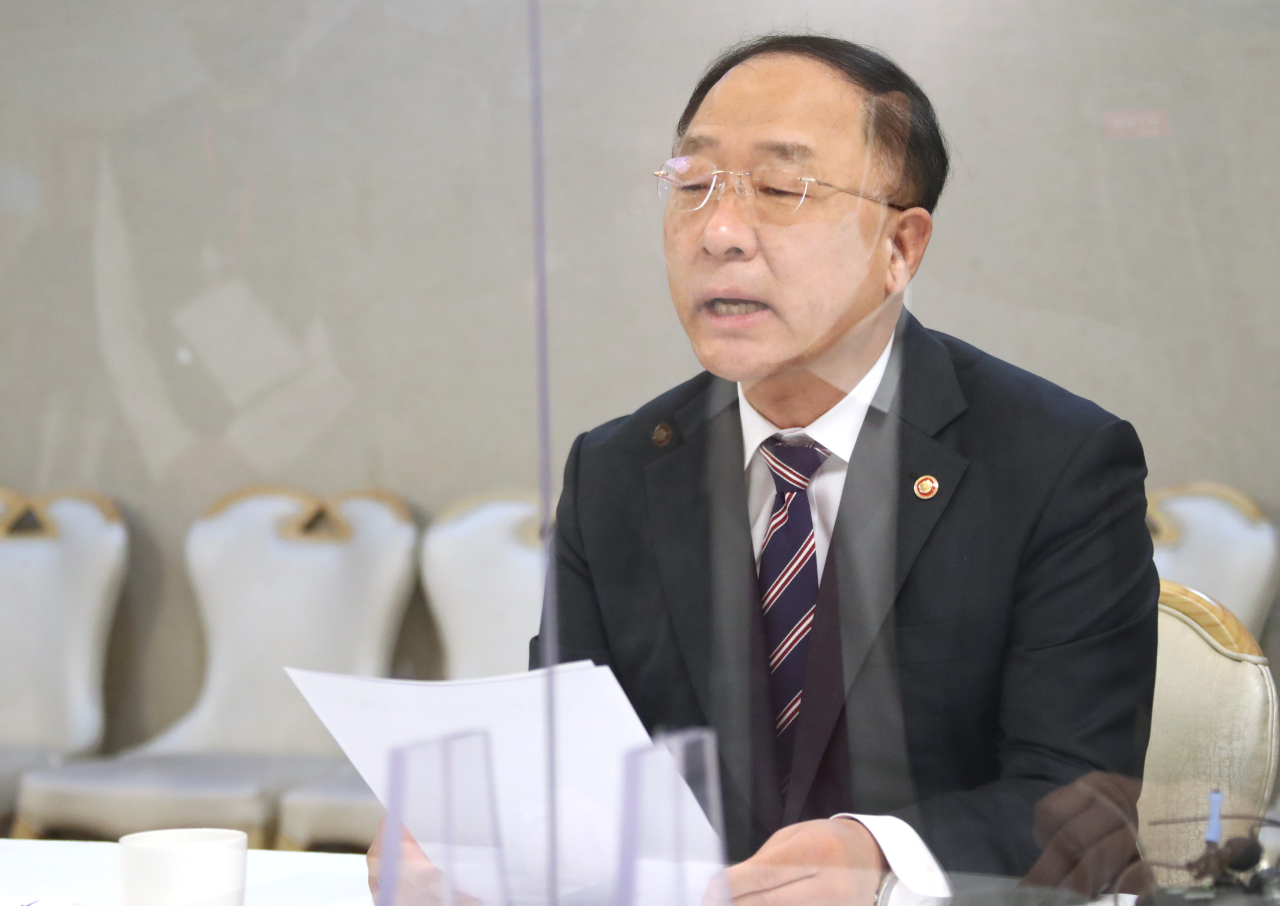 |
Finance Minister Hong Nam-ki speaks at a meeting of related ministers at the government complex in Seoul on Oct. 27 to monitor the local real estate market and discuss policies aimed at stabilizing it. (Yonhap) |
South Korea’s fiscal policy chief said Wednesday that the nation’s overheated housing market is showing signs of cooling down with the government’s tightened grip on ample liquidity amid the COVID-19 pandemic as well as its home supply plans.
“Affected by a series of government measures, including announcements of housing supply plans, benchmark interest rate hike and tougher household debt control measures, an upward trend in housing prices has slowed and changes in market sentiment have become clearer,” Finance Minister Hong Nam-ki said during a ministers‘ meeting on real estate.
The pace of home price growth in Seoul, which hovered between 0.2 percent and 0.22 percent every week since August, fell to the 0.1 percent level at the end of September, extending a downtrend to reach 0.17 percent on Oct. 11, according to the data from the Korea Real Estate Board.
In addition, the agency’s index gauging home-buying sentiment declined for the six consecutive week from 107.2 estimated in the first week of September, to 101.6 on Oct.18, down 0.4 from a week earlier. When the index surpasses 100, it means demand for apartments is stronger than the supply in the market.
“The country is now at a critical point to further stabilize home prices. The government will take every necessary measure to add momentum to housing price stabilization, including speeding up the implementation of home supply plans, tightening management of liquidity in the property market and stemming illegal activities that roil the local property market,” Hong said.
Earlier in Feb. 4, the government announced it would provide 323,000 new housing units in Seoul and 293,000 in the surrounding Gyeonggi Province by 2025. Plans to achieve this included easing building regulations such as the floor area ratio of residential buildings near subway stations, while supporting redevelopment projects.
The Ministry of Land, Infrastructure and Transport plans to select locations in Seoul for the state-led redevelopment project by the end of this year.
Some market experts voiced skepticism over the government’s housing market evaluation, saying the current slowdown of home price growth would be temporary due to a supply shortage.
“The central bank’s rate hike coupled with tougher lending rules cooled down the panic buying trend in the local real estate market. However, as long as a supply shortage of homes prevails, the pace of growth in housing prices will gain speed gradually,” said Kwon Dae-jung, a real estate professor at Myongji University.
The number of Seoul apartments for sale next year is estimated at 20,463, sharply down 34.3 percent from 31,211 units this year, according to housing information provider Real Estate 114.
Meanwhile, a total of 2,909 illegal property speculators have been prosecuted since the Land Ministry, the Korean National Police Agency and the National Tax Service initiated a tough crackdown real estate speculation and tax evasion in March, according to the fiscal chief.
The move was aimed at rooting out illegal speculation and taking a strong punishment against those caught, responding to a massive property speculation scandal involving former and incumbent officials at the Korea Land & Housing Corp.
The LH scandal erupted in early March after two civic groups accused 14 LH officials of using undisclosed information to buy about 10 billion won ($8.75 million) worth of farmland in in Gwangmyeong or Siheung from April 2018 to June 2020, before of the government’s new town development plan announcement raised property prices there.
By Choi Jae-hee (
cjh@heraldcorp.com)








![[Today’s K-pop] Blackpink’s Jennie, Lisa invited to Coachella as solo acts](http://res.heraldm.com/phpwas/restmb_idxmake.php?idx=644&simg=/content/image/2024/11/21/20241121050099_0.jpg)